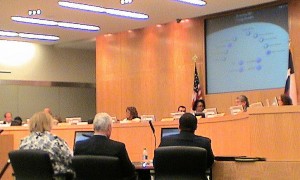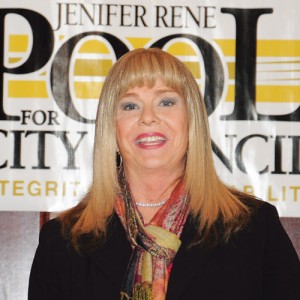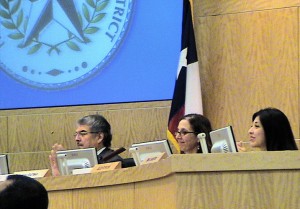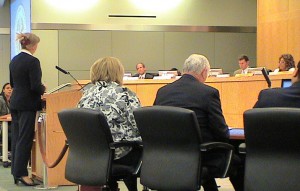HISD Becomes LGBT-Inclusive
 Jenifer Rene Pool’s five-year effort pays off
Jenifer Rene Pool’s five-year effort pays off
by Brandon Wolf
See also sidebar: 2 Letters
1. A teacher’s firsthand experience
HISD teacher David Embry’s June 23 speech to the HISD Board of Trustees
2. A teacher’s contract not renewed after coming out
HISD teacher Juan Alvarado’s letter to the HISD School Board WEB ONLY
Late in the afternoon of August 11, 2011, HISD Board of Trustees President Paula Harris called for a vote on agenda item B-3 “Revisions to Board Policy, Employee Welfare: Freedom from Discrimination, Harassment, and Retaliation.” Votes were cast and the video screen above her head showed that the board members had voted 8–0 in favor of the revisions.
For Houston’s LGBT community, it was a momentous step forward. This revision means that HISD employees are now protected from employment discrimination based on sexual orientation, gender identity, and gender expression. There was no great show of emotion in the board room, but for those who understood what had just happened, it was an historic moment.

A casual observer may have seen the vote as a slam dunk—a sign of the times—HISD just trying to catch up with other school districts around the nation. Despite what it might have seemed, the board’s action was instead a sweet victory for a number of local activists who have been working relentlessly on this issue for the last five years.
Heading the effort has been Jenifer Rene Pool. Although she officially started her efforts in 2006, her passion for the issue dates back to as early as 1997.
Coming Out on the Job
Prior to 1997, Pool managed multi-million-dollar construction projects around the Houston area. She was well liked and well compensated. She was also in the final stages of a transsexual transition, from male to female.
“I lived as a male during the day and as a female at night,” Pool says. “But the day came when I had to start my ‘real life’ test—living in the opposite gender as a prerequisite to sexual reassignment surgery.”
This transition did not sit well with her boss. He told her she was being let go because he didn’t know what to do with “something” like her. Pool emphasizes the word thing with a look of disgust. “Men in that industry care more about their image amongst other men than they do about money.”
She applied for every job opening for which she was qualified—usually very well qualified. She was consistently turned down.
“Finally, I went into a Chaco’s Restaurant,” says Pool. “There was a sign out front saying they were hiring for all positions. I told them I would take any job—even busing tables.”

Because of her flawless grooming and attractive appearance, she was hired as a greeter and hostess. One crowded evening, she maneuvered to get two very well-dressed women seated early. Later, she checked to make sure they were happy with the service and food.
The women headed a modeling agency, and Pool said she loved modeling. They asked her to bring by her portfolio, and to their surprise she already had it in her car.
They liked what they saw and got her jobs modeling Baby Boomer athletic outfits and assignments as a spokesmodel. Encouraged, Pool applied for other jobs with other agencies. She was told that they didn’t need “a specialty act.”
Turning the Tables
Pool underwent sexual reassignment surgery in 1999. She was a member of Alcoholics Anonymous at the time, and one evening another member asked her to help him with a construction remodeling job. He needed someone to do the work of obtaining all the necessary permits for the job.
This led to Pool setting up a business called Permit Solutions in 2000. She also offered consulting services. She marketed her services to construction firms and built up a clientele. “Some of them were people who didn’t want me as an employee when I started to transition,” she says, “but most of them didn’t recognize me and were glad to make use of my services.”
The business did well, and Pool laughs when she relates that she had two fee schedules; one was for the regular customers and the other was for the people who had been rude to her before. The second fee schedule was noticeably more expensive.
Entering the Field of Politics
Pool worked hard in the 1997 campaign of then-Councilmember Annise Parker. When Parker won, Pool developed a passion for politics. “Electing a lesbian public official was a big deal, and I realized I was part of it,” Pool says.
To follow her new passion, Pool became close to Houston transgender pioneer Phyllis Frye, long-time gay activist Ray Hill, and political whiz Grant Martin. “They were my mentors,” she says.
Pool’s partner at the time became the vice-president of the Houston GLBT Political Caucus, and Pool began attending meetings regularly and learning about all the issues. Soon, she volunteered to screen candidates for endorsements.
By 2004, Pool had been elected to the Caucus board. In 2006, her mentors all encouraged her to run for the presidency of the organization, and she won.
“I was concerned that there might be issues with me being the first transgender president of the Caucus,” Pool remembers. But she proved to be a popular president and served three terms, through 2008.
Opening a Dialog with HISD
In 2007, Pool was contacted by HISD. “They wanted us to support an $805 million bond issue,” she says. “I felt that since LGBTs have children, this was a valid issue to consider. The bonds would be used to renovate school campuses.”
Pool insisted that HISD Superintendent Abelardo Saavedra screen personally with the Caucus. Endorsement of the bond issue was approved, and the Caucus became the first organization to support the issue. “We feel that the Caucus endorsement helped swing the final vote,” says Pool.
With endorsement of the bond issue, there was expectation that Saavedra would work to revise the Student Code of Conduct and the HISD Employment Non-Discrimination Policy. Pool began working with the HISD administration to draft the language of the revisions to include sexual orientation, gender identity, and gender expression.
Despite repeated meetings with HISD, no progress was made. Pool decided not to run for the Caucus presidency in 2009, but in her parting address to the members, she promised to continue working on the HISD policy revisions.
Saavedra announced he was leaving HISD in September 2009, and any leverage gained from supporting the bond issue seemed lost. But Pool refused to give up and kept the dialog open even when no change appeared to be occurring.
Terry Grier became the new HISD Superintendent in November 2009. Grier came from a position as head of the Guilford County Schools in Greensboro, North Carolina, where he had worked for almost eight years. During that time, he had helped to make that district’s policies inclusive with protections for sexual orientation, gender identity, and gender expression.
Continuing the Dialog
Pool continued to schedule meetings with the HISD administration. But the HISD legal counsel told her that LGBTs were already protected under the word “sex.”
Pool knew this was not specific enough. In 2005, she had joined KPFT’s Queer Voices show and had interviewed LGBTs who had been hassled or terminated by HISD. The most common way to get rid of teachers was to not renew their contracts.
At this point, Pool talked with Frye about the problems with HISD. Frye suggested that she do research and provide specifics to the administration.
Pool collected 200 pages of material regarding inclusive policies of other school districts across the nation. The HISD administration still refused to consider revisions for their district.
Undaunted, Pool collected material documenting school districts that had been successfully sued for discriminating against LGBTs. “The material showed that districts had lost over $32 million from lawsuits,” she says.
Finally, the HISD administration began to take the subject seriously, fearing possible lawsuits against their district. They started to work with Pool, drafting language for procedures to follow if an LGBT student or employee filed a complaint of discrimination.
At that point in time, Josephine Tittsworth and Christopher Busby had successfully worked to change policies at the University of Houston. The language they had drafted was presented to HISD and used to create the final HISD changes.

A revision to procedures was approved and added to the HISD procedures manual. But a procedure is not a policy; it is only a guideline. Pool knew the new guidelines were a step in the right direction, but she was also determined not to give up until an actual policy revision was made.
Anna Eastman was elected to the board in 2009 to represent District I. She took the proposed revisions seriously and gave her support to them.
But in 2010, board member Greg Meyers was elected to serve a one-year term as board president. Meyers represents District VI, which includes the highly conservative Memorial area. As board president, he refused to bring the revisions to the table.
In late 2010, Juliet Stipeche was endorsed by the Caucus for Board Position VIII. With the support of the Caucus, she won the race by 44 votes.
Just two months before her victory in September 2010, nine gay students across the nation had committed suicide as a result of bullying. One of those students was 13-year-old Asher Brown, who attended school in the Cypress-Fairbanks School District.
“The HISD Board passed a resolution indicating their concern about the situation, but did not specifically mention GLBTs,” says Pool. HISD administration told Pool that the district didn’t have a problem with LGBT students being bullied.
Pool gave them a copy of the results of a project undertaken by the students in Rice University’s LGBT Studies class. Under the guidance of instructor Dr. Brian Riedel, the students had conducted a survey of LGBT bullying in HISD. The survey proved the HISD administration was seriously uninformed about the realities of bullying within their system. “The elephant was in the room,” says Pool.

It All Comes Together
“In 2011, we had ‘the perfect storm,’” Pool explains. “Paula Harris had been elected as the new board president and indicated she would bring the revisions to the table; Anna Eastman was now joined by Juliet Stipeche in pushing for the revisions, and the recent gay teen suicides kept the issue alive in the media.”
“The issue was brought to the board,” says Pool, “and everyone worked every connection they had.”
On June 23, 2011, the first reading of the revisions was made by the board. During the time allotted for the public to address the issue, three people spoke in support of the issue—transgender activist Cristan Williams; Zeph Capo, an executive board member for the Houston Federation of Teachers; and David Embry, an HISD teacher who had been the subject of repeated harassment because of his sexual orientation. The board passed the motion 7–0.
The revisions required a second reading, which was made on August 11, 2011. Busby addressed the board during the open microphone period and was followed by Pool. The board passed the motion 8–0, and history was made.
After the successful passage of the revisions, Pool reflected on the victory: “Don’t quit—keep on pecking away—and stay consistently in front of them.”
Pool speaks from the heart. She forced the dialog to continue year after year. She continued to make phone calls to board members, even when they didn’t return them. She took advantage of meet-and-greet sessions after board meetings to personally lobby for the cause. “I even got up early in the morning to be in parking lots and catch people as they were arriving in their cars and walking in to work, pressing for those revisions.”
Even passage of the HISD revisions won’t stop Jenifer Pool. She is already making plans with Busby and other local activists to begin lobbying the dozens of smaller school districts in Harris County and the surrounding areas. Because HISD is the seventh largest school district in the nation, Pool is convinced that the HISD victory will weigh heavily in bringing change to the other districts.
See also sidebar: 2 Letters
1. A teacher’s firsthand experience
On June 23, 2011, HISD teacher David Embry delivered this speech to the HISD Board of Trustees
2. A teacher’s contract not renewed after coming out
HISD teacher Juan Alvarado’s letter to the HISD School Board WEB ONLY
Brandon Wolf is a frequent contributor to OutSmart magazine.











Comments